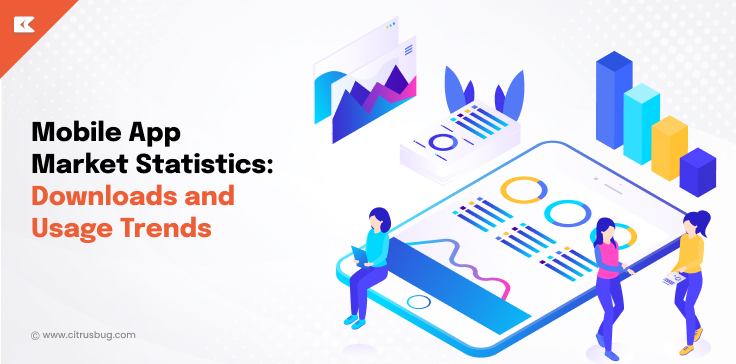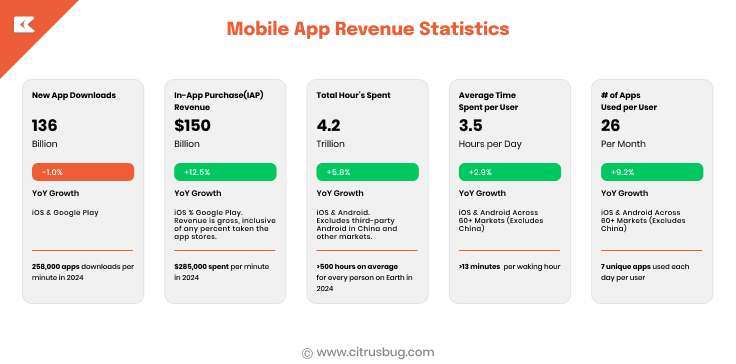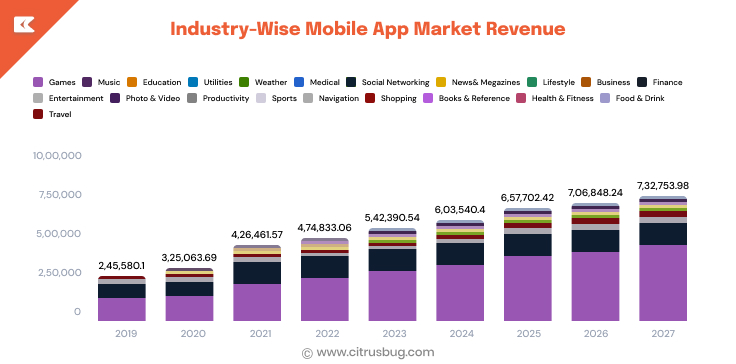Mobile App Market Statistics: Downloads and Usage Trends
- September 15, 2025
-
1640 Views
- by Ishan Vyas

The market for mobile apps has transformed into one of the more lucrative and rapidly growing industries in the world. There are billions of mobile users around the world, apps aren’t just tools for communication but are now essential to health, finance, business, shopping, entertainment, and other. From the generation of revenue to user engagement, data on mobile app market statistics provides fascinating insights about the way people use technology.
On this page, we’ll examine mobile app use and revenue figures, recent development and download patterns shaping today’s digital landscape.
Mobile App Usage Statistics
The rapid growth of smartphones has caused a big rise in mobile app use around the world. Today, apps are part of daily life for talking, shopping, entertainment, and work. Since billions of people use apps every day, understanding the main trends shows how people use them and how businesses can meet their needs.
Key Insights at a Glance
- By 2025, there will be more than 6.9 billion smartphone users worldwide, showing how important mobile devices have become in daily life.
- People spend an average of 4–5 hours a day on their phones, and most of this time is spent using apps.
- Almost 90% of mobile screen time goes to apps, not web browsing.
- Users install more than 80 apps but only use 30 of them on average each month.
- Gen Z and millennials are mainly using gaming, social media and entertainment apps. Older users prefer utility, finance and healthcare apps.
- AI-powered personalisation like push notifications and recommendations, keeps users engaged and encourages return.
These mobile app market statistics show that mobile apps are now a key part of everyday life. From entertainment and communication to healthcare and finance, apps are shaping how people behave online, and businesses must adjust to meet these new digital habits.
Mobile App Revenue Statistics
The mobile app market research shows a dramatic increase in revenue for apps, as consumer spending on iOS and Google Play reaches new heights. This growth highlights the importance of mobile app market statistics to businesses looking at monetisation in today’s digital world.
The global mobile app market is expected to generate approximately $150 billion by 2024 through in-app sales, subscriptions and paid apps. This shows a strong monetisation opportunity.
- The mobile market has stabilised globally more than 15 years since the launch of the Apple App Store.
- The number of downloads on iOS and Google Play was flat at 136 billion in 2024 and has remained between 135 and 140 billion per year since 2020.
- Consumers spent 4.2 trillion hours on apps, which averages to 3.5 hours per day per mobile user.
- Digital fatigue has led to a slowdown in growth of time spent year-over-year. In 2024, it will be 5.8%, down from 7.7% in 2023.
- The mobile app revenue in 2024 will reach $150 billion, an increase of 13% YoY.
- Non-gaming apps drove most of the revenue growth, with +23% YoY, while gaming revenue rebounded by +4% YoY.
- The U.S. led the global monetisation with $52 billion of in-app purchases, which is over one third of global totals. This growth was 16% year-over-year.
- Europe has outpaced the global average, with app revenues rising 24% YoY in key markets like the UK, Germany, France and Italy.
Google Play Store App Revenue
In 2024, global consumer spending on the Google Play Store, including in-app purchases, subscriptions, ads, and paid downloads, was about $55.5 billion.
Projections indicate Google Play revenue may reach $60–65 billion in 2025, reflecting steady growth and adoption across categories. For reference, this is consistent also with other global app market statistics indicating a continuous growth trend in global mobile app monetisation.
However, some forecasts project that app and game revenues on Google Play may exceed $60 billion in 2025, with gaming being the largest contributor of about $40.1 billion. This affirms that it is the largest revenue contributor on the platform among global mobile app market statistics.
Apple App Store Revenue
The Apple App Store is the leader of direct app and game revenue, producing approximately $111.88 billion in 2024 based on projections, which could reach $138 billion in 2025. Growth of this sort emphasises Apple’s user base and consumer spending power.
Beyond fairly rapid app sales, Apple’s larger ecosystem is substantial, producing nearly $1.3 trillion in billings and sales in 2024 through digital goods, services, in-app advertisements, and physical goods.
This format not only exemplifies Apple’s strength but furthers the growth of the overall mobile app market as a whole. Increased worldwide use and new models of monetisation are boosting revenue in both storefronts.
Industry-Wise Mobile App Market Revenue
The chart shows the industry-wide revenue of mobile apps worldwide, for each year from 2019 to 2027. It demonstrates the rapid growth of the global mobile app market where the revenue will nearly triple in less than 10 years. Different industries contribute differently, but games are clearly the biggest, followed by social networking, entertainment, and shopping apps.
Mobile app revenue is growing rapidly, rising from $245.6 billion in 2019 to a projected $732.7 billion in 2027, showing how digital adoption and mobile-first services are reshaping global markets.
Games dominate the market, contributing the highest revenue among all categories every year, powered by in-app purchases, ads, and premium features that keep users engaged and spending.
Social networking, entertainment and shopping apps are the second largest category, growing slowly as more and more users spend their time connecting, streaming and shopping on a mobile platform.
Music, lifestyle, photo & video, and finance apps are generating steady revenue increases, highlighting their usefulness in our busy lives, and the increase of content creation and banking using mobile devices.
Health & fitness, and productivity apps are becoming more important to our day-to-day routines as we do everything but move away from the daily digital lifestyle.
Books, weather, utilities, and travel apps contribute smaller shares but still show gradual growth, highlighting niche but steady demand across specialized categories of mobile usage.
App revenues cross $600 billion by 2024, highlighting the strong expansion of the digital economy and the shift toward app-based services as a primary revenue stream for businesses.
By 2027, total revenue is expected to exceed $732 billion, proving apps’ growing global demand and the critical role mobile technology plays in driving innovation and user engagement worldwide. These insights provide a clear view of mobile app market statistics and trends, helping developers, investors, and businesses strategise for sustained growth.
Mobile App Download Statistics & Trends
Global App Download Trends
The number of global app downloads has grown rapidly in recent years, demonstrating how people rely on mobile apps. In 2021, Google Play and Apple App Store users downloaded over 230 billion apps, showing the demand for digital tools.
The State of Mobile report by Algoworks shows that the mobile app market continued to grow in 2022. Downloads reached 255 billion according to statistics. This is a substantial increase from the 230 billion downloads in 2021. It shows how mobile apps have become more important in our everyday lives.
With billions of apps downloaded every year, the app economy is a major driver of digital technology, use and revenue worldwide.
Free vs. Paid Apps & Monetisation
Free apps dominate the mobile market, with most apps available at no upfront cost. Studies show users prefer free downloads, making them the default choice across platforms.
In January 2025, 97% of Android apps on Google Play were free. Only 3% require payment upfront, which reinforces the preference for free apps.
These apps are free but generate nearly 98% of global app revenue via in-app purchases and ads. Mobile app market statistics are crucial in determining business strategies around the world.
Recent Developments in the Mobile App Ecosystem
AI agents have taken on a greater role in the development of mobile apps. In mobile applications and development practices, they automate tasks such as screen generation, API integration, autonomous testing and regression fixes.
According to the latest mobile app market trends, super-apps are expanding rapidly beyond Asia into Latin America and Africa. This is due to increasing mobile connectivity and changing user preferences. For instance, Peru’s Yape now serves over 3 million users in Bolivia with 1.35 million affiliated small businesses by mid-2025.
AI agents will be more intelligent and autonomous in 2025. They will also be deeply integrated into apps. These agents are multi-agent collaborative, memory-enabled models, voice-first user experience, domain-specific abilities, and can be seamlessly embedded within SaaS platforms. They go beyond simple chatbots.
Generative AI is fueling a second mobile app boom, sparking renewed innovation throughout the industry. AI-powered apps will reach 3.3 billion downloads in 2024. This is a 26% increase YoY, showing how app market statistics highlight the rapid evolution of this sector.
Conclusion
Mobile app market statistics show that the industry is growing rapidly, with billions of users and a steady increase in revenue and downloads. Apps are now an integral part of our daily lives, from gaming and shopping to finance and healthcare. These apps are now essential for personal use as well as business growth, with companies increasingly relying on mobile app development services to build scalable and user-friendly solutions.
Innovation is challenged by emerging trends like AI-powered personalisation and super-apps. There still will be apps driving digital transformation as mobile usage increases. Apps are the key driver of convenience, connectivity and long-term success.





 SaaS Development
SaaS Development Web Application Development
Web Application Development Mobile Application Development
Mobile Application Development Custom Software Development
Custom Software Development Cloud Development
Cloud Development DevOps Development
DevOps Development MVP Development
MVP Development Digital Product Development
Digital Product Development Hire Chatbot Developers
Hire Chatbot Developers Hire Python Developers
Hire Python Developers Hire Django Developers
Hire Django Developers Hire ReactJS Developers
Hire ReactJS Developers Hire AngularJS Developers
Hire AngularJS Developers Hire VueJS Developers
Hire VueJS Developers Hire Full Stack Developers
Hire Full Stack Developers Hire Back End Developers
Hire Back End Developers Hire Front End Developers
Hire Front End Developers AI Healthcare Software Development & Consulting
AI Healthcare Software Development & Consulting Healthcare App Development
Healthcare App Development EHR Software Development
EHR Software Development Healthcare AI Chatbot Development
Healthcare AI Chatbot Development Telemedicine App Development Company
Telemedicine App Development Company Medical Billing Software Development
Medical Billing Software Development Fitness App Development
Fitness App Development RPM Software Development
RPM Software Development Medicine Delivery App Development
Medicine Delivery App Development Medical Device Software Development
Medical Device Software Development Patient Engagement Software Solutions
Patient Engagement Software Solutions Mental Health App Development
Mental Health App Development Healthcare IT Consulting
Healthcare IT Consulting Healthcare CRM Software Development
Healthcare CRM Software Development Healthcare IT Managed Services
Healthcare IT Managed Services Healthcare Software Testing services
Healthcare Software Testing services Medical Practice Management Software
Medical Practice Management Software Outsourcing Healthcare IT Services
Outsourcing Healthcare IT Services IoT Solutions for Healthcare
IoT Solutions for Healthcare Medical Image Analysis Software Development Services
Medical Image Analysis Software Development Services Lending Software Development Services
Lending Software Development Services Payment Gateway Software Development
Payment Gateway Software Development Accounting Software Development
Accounting Software Development AI-Driven Banking App Development
AI-Driven Banking App Development Insurance Software Development
Insurance Software Development Finance Software Development
Finance Software Development Loan Management Software Development
Loan Management Software Development Decentralized Finance Development Services
Decentralized Finance Development Services eWallet App Development
eWallet App Development Payment App Development
Payment App Development Money Transfer App Development
Money Transfer App Development Mortgage Software Development
Mortgage Software Development Insurance Fraud Detection Software Development
Insurance Fraud Detection Software Development Wealth Management Software Development
Wealth Management Software Development Cryptocurrency Exchange Platform Development
Cryptocurrency Exchange Platform Development Neobank App Development
Neobank App Development Stock Trading App Development
Stock Trading App Development AML software Development
AML software Development Web3 Wallet Development
Web3 Wallet Development Robo-Advisor App Development
Robo-Advisor App Development Supply Chain Management Software Development
Supply Chain Management Software Development Fleet Management Software Development
Fleet Management Software Development Warehouse Management Software Development
Warehouse Management Software Development LMS Development
LMS Development Education App Development
Education App Development Inventory Management Software Development
Inventory Management Software Development Property Management Software Development
Property Management Software Development Real Estate CRM Software Development
Real Estate CRM Software Development Real Estate Document Management Software
Real Estate Document Management Software Construction App Development
Construction App Development Construction ERP Software Development
Construction ERP Software Development









